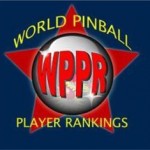Originally published in Skill Shot 23, April 2012
Did you know that there are worldwide pinball player rankings? And that Seattle is home to several of the top 100 players in the world? It’s true!
The World Pinball Player Rankings (WPPR) is the preeminent system used by pinball  players to rank each other on the global pinball scene. WPPR is run by the International Flipper Pinball Association (IFPA), and currently tracks over 13,000 players across more than 3,000 competitions. Ultimately, the whole system is about winning ranking points at pinball tournaments.
players to rank each other on the global pinball scene. WPPR is run by the International Flipper Pinball Association (IFPA), and currently tracks over 13,000 players across more than 3,000 competitions. Ultimately, the whole system is about winning ranking points at pinball tournaments.
If you’ve ever played in an IFPA-sanctioned event (and you might not have even known it), you’re ranked! “The amount of points you receive is based on how you place, who  your opponents are, and the frequency of the tournament,” says Jeff Groper, currently ranked #79 worldwide. Tournaments can be IFPA-sanctioned if they are open competitions and advertised on the IFPA website at least 30 days before they happen.
your opponents are, and the frequency of the tournament,” says Jeff Groper, currently ranked #79 worldwide. Tournaments can be IFPA-sanctioned if they are open competitions and advertised on the IFPA website at least 30 days before they happen.
Cayle George, currently #2 in the world and reigning IFPA World Champion, gives the breakdown: “WPPR only tracks your 15 best event finishes by point total. Every event starts with a base value of 25 points for the main event. That number goes up as higher  and higher ranked players attend the event. So if a handful of the top players in the world compete in an event, the WPPR value will rise and could be worth upward of 50 points.” With all these highly-ranked players in Seattle, local events could be worth big points!
and higher ranked players attend the event. So if a handful of the top players in the world compete in an event, the WPPR value will rise and could be worth upward of 50 points.” With all these highly-ranked players in Seattle, local events could be worth big points!
The 25 point base-value only applies to annual tournaments. If a tournament is held  more frequently, then the point value is divided by the number of annual occurrences — so a tournament that happens four times a year would be worth 6.25 points apiece. Additionally, points age, ensuring a focus on current active participation. After one year, points drop to 75% of their original value, down further to 50% after two years, and eventually to zero after three.
more frequently, then the point value is divided by the number of annual occurrences — so a tournament that happens four times a year would be worth 6.25 points apiece. Additionally, points age, ensuring a focus on current active participation. After one year, points drop to 75% of their original value, down further to 50% after two years, and eventually to zero after three.
“The system aims to help promote the growth of competitive pinball by encouraging  players to travel to events that they wouldn’t otherwise attend,” says Kevin Birrell. It appears to be working — Raymond Davidson, currently #66, says “I
players to travel to events that they wouldn’t otherwise attend,” says Kevin Birrell. It appears to be working — Raymond Davidson, currently #66, says “I  know that if, for example, the Gladstone Gridiron Classic down in Portland didn’t award ranking points, I probably would never have bothered to drive down there.” Raymond ended up placing 4th in that tournament, earning 12.84 points in the process.
know that if, for example, the Gladstone Gridiron Classic down in Portland didn’t award ranking points, I probably would never have bothered to drive down there.” Raymond ended up placing 4th in that tournament, earning 12.84 points in the process.
So why care about the World Pinball Player Rankings? Cayle has an opinion: “WPPR has greatly increased interest and participation in competitive pinball, and is the single greatest reason for the huge rise in competitive pinball over the last 5 years.” “It definitely generates more interest,” says Jeff. “In addition to seeing how you compare to  other players, qualification for the annual IFPA championships depends on your ranking. There are tournaments that seed players, or restrict them to particular divisions based on ranking as well.”
other players, qualification for the annual IFPA championships depends on your ranking. There are tournaments that seed players, or restrict them to particular divisions based on ranking as well.”
 For 121st-ranked Julie Gray, it’s all about the competition: “As someone who grew up playing competitive sports, this is a natural thing to do. It provides a vehicle for people to set goals that inspire them to improve their skills. You may pick out a rank that you want to achieve by the end of the year. Or, secretly pick which players you want to pass.”
For 121st-ranked Julie Gray, it’s all about the competition: “As someone who grew up playing competitive sports, this is a natural thing to do. It provides a vehicle for people to set goals that inspire them to improve their skills. You may pick out a rank that you want to achieve by the end of the year. Or, secretly pick which players you want to pass.”
Another highly-ranked local player is Maka Honig, currently #76, whose MAK initials can be seen on machines in bars all over town. Maka gives this great personal take on  WPPR: “For me personally, I like the pinball rankings because it’s a great way to keep track of my progress in pinball competitions. It gives pinball players something tangible to look at and say, ‘alright I’m in the top 200, if I do well at this upcoming tournament I can gain 20 spots.’
WPPR: “For me personally, I like the pinball rankings because it’s a great way to keep track of my progress in pinball competitions. It gives pinball players something tangible to look at and say, ‘alright I’m in the top 200, if I do well at this upcoming tournament I can gain 20 spots.’
“You don’t get to be ranked in the WPPR top 100 by accident. It requires showing up to a  lot of pinball tournaments where everyone is every bit as good as you, and still consistently doing well under pressure. It takes years. In the end, I play pinball because it’s challenging and fun…and I want the high score. WPPR points are just for fun. There are plenty of great pinball players that are NOT ranked high because they don’t/can’t participate in lots of tournaments.”
lot of pinball tournaments where everyone is every bit as good as you, and still consistently doing well under pressure. It takes years. In the end, I play pinball because it’s challenging and fun…and I want the high score. WPPR points are just for fun. There are plenty of great pinball players that are NOT ranked high because they don’t/can’t participate in lots of tournaments.”
And that’s what it really comes down to – play flipper skill games for fun. It’s more fun to compete!
Want to know more about WPPR or IFPA? Want to check your ranking? Visit pinballrankings.com (run by the IFPA). If you want to learn about upcoming tournaments in the Seattle area, don’t forget to check the events calendar on skill-shot.com!

